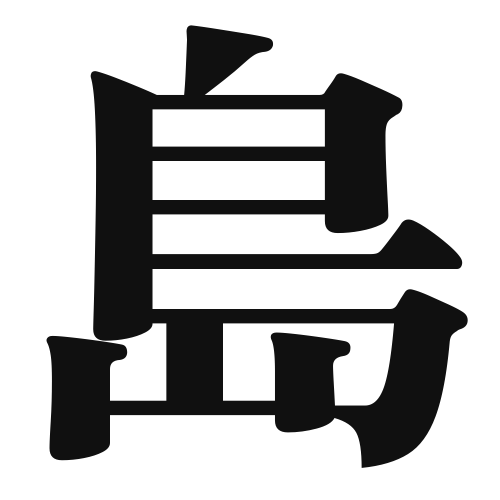1. Overview of Meaning
The kanji “島” (shima) means “island.” It refers to a landmass that is surrounded by water, typically smaller than a continent. Islands can be found in oceans, seas, rivers, and lakes.
2. Formation and Radical
Formation of the Kanji: The kanji “島” is a combination of two components: the radical “山” (yama), which means “mountain,” and the phonetic component “島” (shima). This kanji is classified as a compound character (会意文字), as it combines meaning and sound.
Radical: The radical of “島” is “山,” which signifies its connection to landforms, specifically mountains.
3. Examples of Usage
Common Words and Phrases: Some frequently used words that include “島” are:
- 日本の島 (Nihon no shima) – Japanese islands
- 無人島 (Mujin-tō) – uninhabited island
- 島国 (Shimaguni) – island nation
Example Sentences in Daily Conversation:
- 「私たちは夏に島に行く予定です。」(Watashitachi wa natsu ni shima ni iku yotei desu.) – “We plan to go to an island in the summer.”
- 「この島はとても美しいです。」(Kono shima wa totemo utsukushii desu.) – “This island is very beautiful.”
4. Synonyms and Antonyms
Similar Kanji: A similar kanji is “陸” (riku), which means “land” or “mainland.” While “島” refers specifically to land surrounded by water, “陸” refers to solid ground that is not surrounded by water.
Opposite Kanji: The opposite of “島” could be considered “海” (umi), which means “sea” or “ocean.” While “島” denotes a landform, “海” refers to the body of water that surrounds it.
5. Cultural and Historical Background
Connection to Japanese Culture: Islands play a significant role in Japanese culture, as Japan is an archipelago consisting of over 6,800 islands. Many traditional stories, folklore, and customs are tied to specific islands.
Proverbs and Idioms: One common saying is “島流し” (shimanagashi), which refers to the historical practice of exiling someone to a remote island. This phrase reflects the historical significance of islands in Japanese society.
